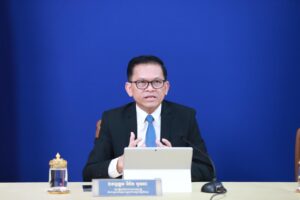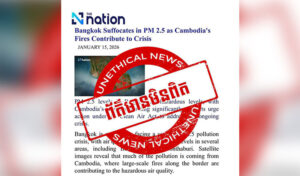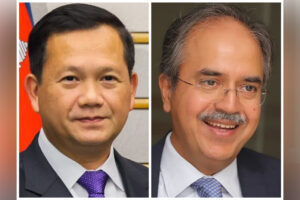Opinion: State-building in a fragile environment
Khmer Times | Max Weber’s seminal definition of the state as an entity that “successfully claims the monopoly of the legitimate use of physical force within a given territory” remains a key element of modern political thought.
But in a fragile environment—where authority is contested, institutions are weak, and legitimacy is elusive—this ideal becomes difficult to realise.
In such a context, state-building is not merely about erecting institutions or holding elections; it is about reconstructing the very foundations of political authority, societal trust, and economic resilience.
The anatomy of the state and the roots of fragility
Historically, states have been established by political leaders who organise people around common goals and mobilise them with the promise of collective reward.
Some argue that a leader’s legitimacy often stems from their ability to provide for their followers. Even today, in both emerging democracies and transitional regimes, political authority is contingent upon the ability to deliver results—be it security, jobs, or justice.
Yet, in a fragile environment, this legitimacy is often undermined by a confluence of risks and the absence of coping capacities.
The OECD defines fragility as the “combination of exposure to risk and insufficient coping capacities of the state, system and/or communities to manage, absorb or mitigate those risks.”
It identifies six dimensions of fragility—economic, environmental, political, security, societal, and human—each of which can independently and collectively compromise a state’s capacity to govern effectively.
Embracing a multidimensional approach
We need to adopt a multidimensional approach to state-building.
Addressing fragility is not just about military security or economic growth in isolation. It requires an integrated framework that recognises the interdependence of political legitimacy, societal trust, human development, and environmental sustainability.
This approach begins with data and deep contextual analysis.
Effective engagement in fragile contexts demands an understanding of local power dynamics, social grievances, institutional capacity, and risk exposure.
No amount of aid can substitute for the lack of local legitimacy or coherent strategy. Development partners must, therefore, go beyond sector-specific interventions and pursue holistic, context-sensitive programming that strengthens the broader ecosystem of state and society.
As the OECD notes, even imperfect efforts in this direction can yield important dividends. What matters is not perfection, but progress—incremental gains in capacity, legitimacy, and inclusion that lay the groundwork for a more stable and resilient state.
Promoting coordinated action
We need to focus on promoting collective action in financing, policy, and programming.
In fragile contexts, where the line between humanitarian relief and development is blurred, siloed approaches no longer suffice.
Instead, actors must collaborate across the humanitarian-development-peace nexus to ensure coherence and sustainability.
Official Development Assistance remains a lifeline for many fragile states. However, in the face of geopolitical shocks and growing fiscal constraints in donor countries, development partners must do more with less.
This means maximising the impact of every dollar through alignment, coordination, and shared theories of change.
Country platforms and integrated financing strategies can help bridge the gap between fragmented initiatives and long-term national priorities.
Without such coordination, interventions risk being redundant or even counterproductive.
Economic resilience as a cornerstone of stability
Fragile states face a vicious cycle: they attract less private investment, struggle to grow domestic markets, and often rely heavily on remittances.
Economic shocks, whether global price volatility or natural disasters, can easily ignite or exacerbate conflict and instability.
Therefore, building economic resilience and promoting economic security is critical to state-building.
Development cooperation must act as an agent of change in the economic dimension of fragility. This includes investing in local enterprise, creating inclusive labour markets, and building institutions that enable rather than hinder entrepreneurship.
Only then can fragile states begin to transition from dependence to self-reliance.
From fragility to functionality
State-building in a fragile environment is not a linear process. It is complex, contested, and context dependent.
But it is not impossible. A state’s strength lies not only in its monopoly of force, but in its legitimacy, capacity, and responsiveness to the needs of its people.
By embracing multidimensional approaches, promoting collective action, and focusing on economic resilience, states can move from fragility to functionality—from the shadow of conflict and collapse to a future of inclusive governance and sustainable peace.
In a fragile environment, the real test of state building lies not in replicating foreign models, but in co-creating institutions and systems that reflect local realities, empower communities, and build trust.
Chheang Vannarith is Founding Chairman of Angkor Social Innovation Park.







